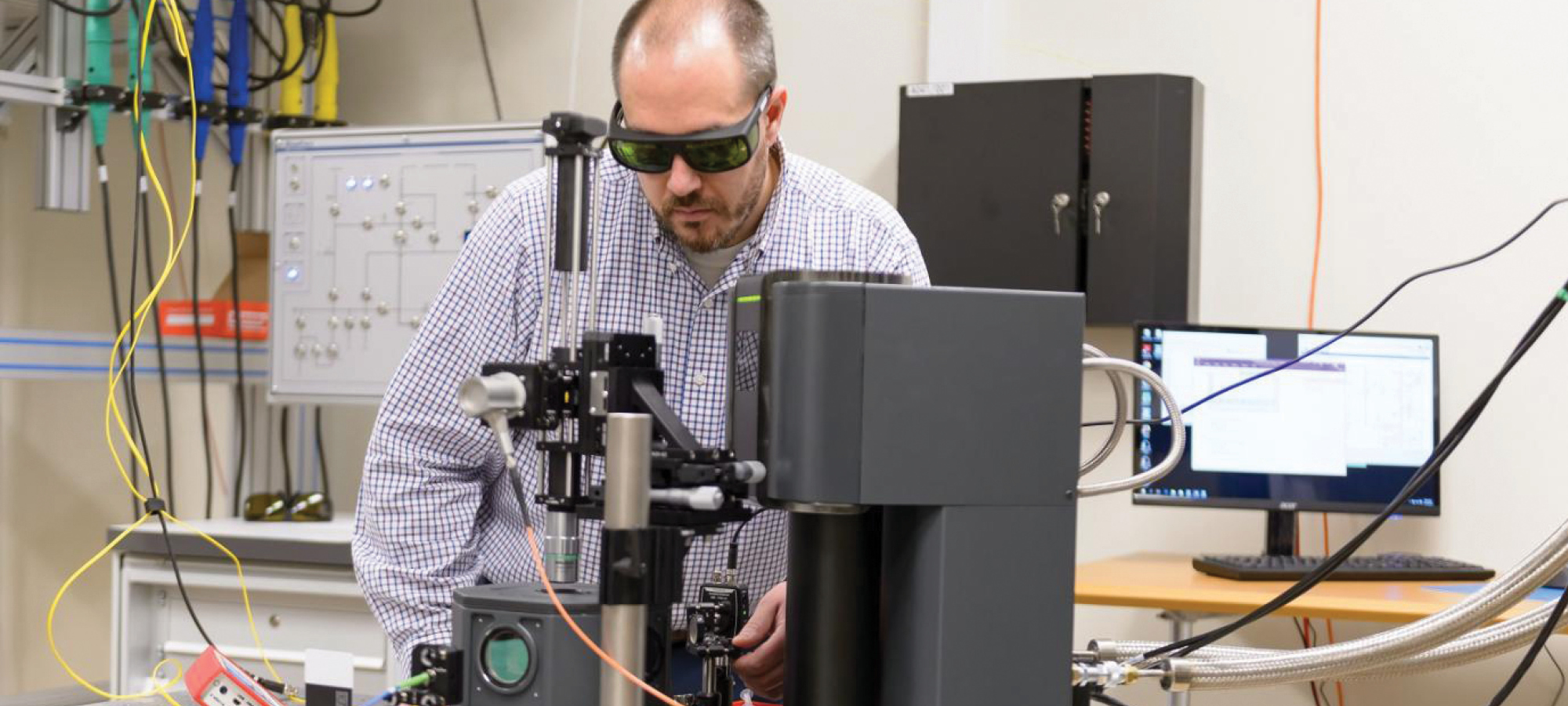
(Photo courtesy Argonne National Laboratory)
A selection of the latest headlines from across campus.
The next internet
In a July 23 news conference at UChicago, the US Department of Energy unveiled a report that lays out a blueprint strategy for the development of a national quantum internet, which relies on the laws of quantum mechanics to control and transmit information more securely than ever before. Crucial steps toward building such an internet are already underway at DOE’s 17 National Laboratories. In February, scientists from Argonne National Laboratory and UChicago entangled photons across a 52-mile “quantum loop” in the Chicago suburbs, successfully establishing one of the longest land-based quantum networks in the nation.
Math meets problems
The University of Chicago is part of two new collaborative math- and science-focused institutes established with National Science Foundation grant funding. UChicago will host the Institute for Mathematical and Statistical Innovation (IMSI), a partnership with Northwestern University, the University of Illinois at Chicago, and the University of Illinois at Urbana-Champaign. Researchers at IMSI will work to apply mathematical and statistical techniques to societal and scientific problems across fields including climate change and health care.
Along with the University of Wisconsin–Madison and the University of Illinois at Urbana-Champaign, UChicago is also part of the new Quantum Leap Challenge Institute for Hybrid Quantum Architectures and Networks, to be headquartered at the University of Illinois’s Quantum Information Science and Technology Center. The institute aims to create new undergraduate and graduate training opportunities in quantum fields and includes partnerships with industry and government labs.
Thank the academies
Ten faculty members were recognized by national scholarly societies this spring. Named to the American Academy of Arts and Sciences (AAAS) were Joy Bergelson, the James D. Watson Distinguished Service Professor in Ecology and Evolution; Maud Ellmann, the Randy L. and Melvin R. Berlin Professor of the Development of the Novel in English; Giulia Galli, Liew Family Professor of Molecular Engineering; William Howell, the Sydney Stein Professor in American Politics at the Harris School of Public Policy, the Department of Political Science, and the College; André Neves, professor in mathematics; and Alexander Razborov, the Andrew MacLeish Distinguished Service Professor in Mathematics and Computer Science.
Susan Goldin-Meadow, the Beardsley Ruml Distinguished Service Professor in Psychology and Comparative Human Development, was elected to the National Academy of Sciences, along with new AAAS member Galli.
Joining the American Philosophical Society were Sidney Nagel, the Stein-Freiler Distinguished Service Professor of Physics; David Tracy, the Andrew Thomas Greeley and Grace McNichols Greeley Distinguished Service Professor Emeritus of Catholic Studies; and David Wellbery, the LeRoy T. and Margaret Deffenbaugh Carlson University Professor in Germanic Studies and the John U. Nef Committee on Social Thought.
Prizes for pedagogy
In June the University honored nine faculty members for outstanding teaching. David Archer, professor in geophysical sciences; Susan Gal, the Mae and Sidney G. Metzl Distinguished Service Professor of Anthropology and Linguistics; Miguel Martínez, associate professor in Romance languages and literatures; and Eric Schwartz, professor in pharmacological and physiological sciences, received Llewellyn John and Harriet Manchester Quantrell Awards for Excellence in Undergraduate Teaching.
Faculty Awards for Excellence in Graduate Teaching and Mentoring went to Elizabeth Asmis, professor in classics; Fred Chong, the Seymour Goodman Professor in Computer Science and the College; Megan McNerney, PhD’05, MD’07, associate professor in pathology; Eric Oliver, professor in political science; and Paolo Privitera, professor in astronomy and astrophysics, physics, and the Enrico Fermi Institute.
Woman of the year
Rising College fourth-year Kristen Busch was named one of Glamour magazine’s College Women of the Year for her work with people with disabilities. Busch cofounded Open Access, a nonprofit that provides workshops on special education issues and manages an online platform with resources for students with disabilities. She is currently developing a project examining how COVID-19 has affected disabled living facilities.
Entrepreneurial spirit
The 24th annual Edward L. Kaplan, MBA’71, New Venture Challenge awarded a record $1 million to 11 UChicago student-run start-ups this year, and the Rattan L. Khosa, MBA’79, First-Place Prize went to land title report company Pippin Title. In the Global New Venture Challenge, Hong Kong–based UTours, which provides auto insurance companies with artificial intelligence tools, took the top spot. Two companies shared first place in the John Edwardson, MBA’72, Social New Venture Challenge: LivingWaters, which has developed a low-cost rainwater collection system, and Impact Toolbox, a digital incubation platform for social entrepreneurs in sub-Saharan Africa. College New Venture Challenge winner Subli offers a peer-to-peer subletting marketplace for university communities.
Sharpen those pencils
How much wood would a woodchuck chuck if a woodchuck could chuck wood? Aspiring members of the College Class of 2025 will have the opportunity to meditate on that question in their supplemental essays. If the marmots’ chucking prowess doesn’t intrigue, applicants can instead misattribute a famous quote, reimagine a well-known map, or decide what can be divided by zero, among other brain-tickling prompts.
